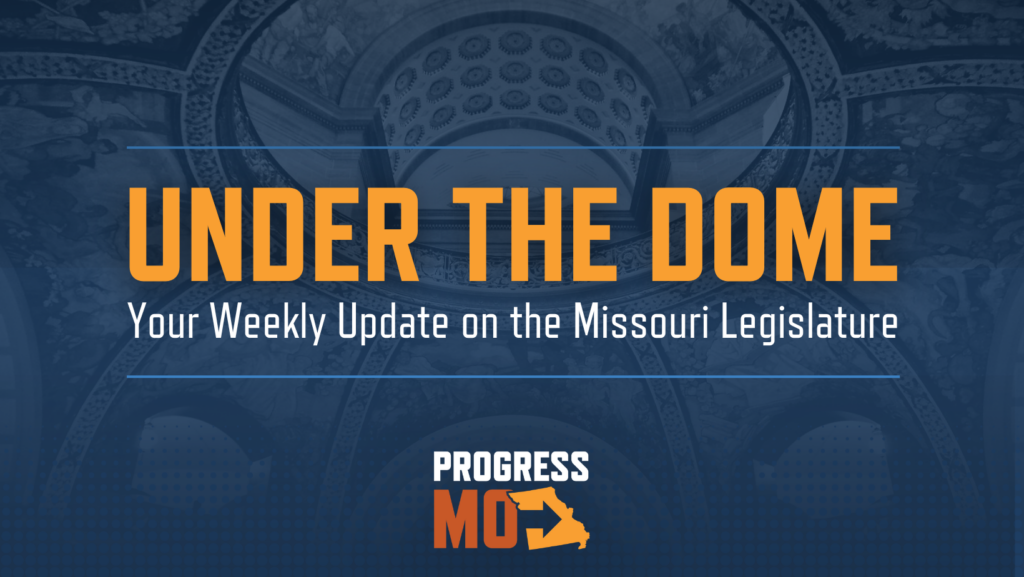Under the Dome – March 15

Welcome back to Under the Dome, your weekly update on the goings-on of the Missouri state legislature.
Stranger and stranger things: The dome appears to be stuck in The Upside Down as legislators gleefully strip voters of rights
The Missouri House thumbed its nose at Missouri voters this week and moved SJR74 forward, taking another step toward upending majority rule as the Show Me State has known it for more than 100 years.
The House Elections Committee heard from more than 800 Missourians across the political spectrum on the topic – in person and in written comments. Only 27 voiced support for the measure, though that didn’t stop committee members from moving forward with taking away voters’ rights anyway.
The legislation would require a statewide majority AND majority vote in five of the state’s eight congressional districts to pass a constitutional amendment through the initiative petition process or a state convention. This could mean a fraction of the population – as few as 23%, according to a Missouri Independent analysis – could override the will of the majority.
“I am dismayed that politicians in Jefferson City are attacking our deepest held democratic ideals by aggressively pushing forward changes to the initiative petition process despite overwhelming opposition to these changes voiced by Missourians like me,” said Beth Franklin, a U.S. Army veteran and Missouri native from Plattsburg.
The next step for the legislation is the Senate, but the earliest that will happen is after legislators enjoy the week off for spring break.
Before the House committee passed the resolution, SJR74 sponsor Sen. Mary Elizabeth Coleman urged the body to restore so-called “ballot candy,” showing once again that Coleman recognizes Missourians won’t easily give up their rights without a slight of hand.
State budget proposal cuts higher ed, child care funding
Meanwhile, the top House budget negotiator unveiled a pared-down version of Gov. Mike Parson’s spending proposal Thursday, saying his plan funnels less money to colleges and universities in exchange for more money for road building.
In January, Parson called on lawmakers to approve a $53 billion spending blueprint that includes raises for Missouri school teachers, a 3% boost in funding for colleges and universities and more money for child care programs.
- Rather than a 3% bump, House Budget Committee Chairman Cody Smith is calling for a 2% increase.
- The proposal also contains fewer dollars to expand child care availability in the state. Smith suggested that there is less need for child care than the governor and business groups believe.
- The spending plan also includes $4 million to boost minimum teacher pay to $40,000 annually, up from the current national low of $25,000.
- Smith also inserted $8 million in the package to pay for Parson’s decision to send Missouri National Guard troops to help patrol the nation’s southern border in Texas.
As reported in the St. Louis Post-Dispatch, the House version was released on the legislature’s final day before a weeklong spring break that marks the unofficial midpoint of an annual session scheduled to end May 17.
Child marriage: Still a thing in Missouri
Finally, two Missouri legislators held a press conference this week to try to convince their colleagues that child marriage is a bad thing and should be outlawed. Currently, minors who are 16 or 17 can get married in Missouri with parental consent.
“Clear and simple, child marriage is the legalization of child rape,” State Sen. Lauren Arthur, a Democrat from Kansas City, told KCUR. “Raising the marriage age to 18, it’s not just legislative action. It’s a moral imperative.”
Until the legislature voted to raise the minimum marriage age to 16 in 2018, Missouri had among the most lenient child marriage laws in the nation — making it an especially popular state for 15-year-olds to travel to be married.
Despite the 2018 change, Missouri law still does not align with international human rights standards, which set the minimum age at 18.